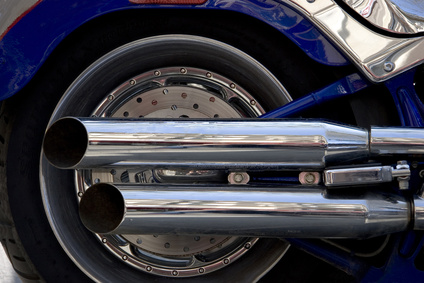
Equipped from the factory with two-into-one exhaust, the Harley-Davidson Road King--Evolution, Twin Cam 88 and Twin Cam 96--is designed for optimal performance and gives off a deep exhaust tone. However, you can modify the stock pipes with chrome slip-on mufflers to further enhance the appearance, sound and performance. Available from several exhaust system manufacturers, slip-ons are more affordable and easier to install than a full exhaust system. Carefully follow the manufacturer's instructions accompanying the hardware. If you have any questions about the installation, seek advice from your local Harley-Davidson technician prior to installation. Refer to your Road King Service Manual, if necessary.
Remove both saddlebags and set aside.
Loosen the bolt from the pinch clamp on the nose of each of the mufflers. Remove the 5/16-inch muffler-mounting bolts from both saddlebags.
Remove the stock mufflers and set aside. Remove the stock mounting brackets from the rubber grommets--leaving the grommets in place--or replace with new grommets if damaged.
Place one of the supplied band clamps over the notched front end of each muffler. Ensure the tightening bolt is accessible from the bottom. Slide the muffler over the stock head pipe. Mount the muffler to the saddlebag supports.
Torque both muffler clamps to 12 ft/lbs. Replace saddlebags. Ensure all the hardware is adequately tightened before starting the motorcycle.
Clean the new chrome pipes and mufflers completely with chrome wax, chrome polish, alcohol, ammonia or warm soapy water and a clean, non-abrasive cloth. Dry with a clean, non-abrasive cloth.